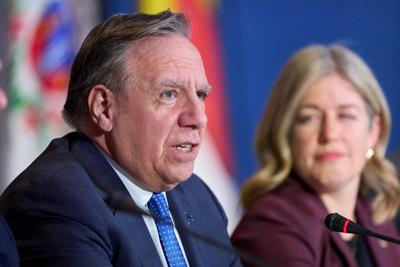A continental crisis is a terrible thing to waste.
But if it helps avert another national unity crisis in Canada, that might offer partial consolation.
Our nation’s trade confrontation could yet prove to be an opportunity if another aspiring nation in Quebec recognizes the new reality of American territorial ambition.
What, you ask, could possibly be the interplay between America’s fantasy of hegemony and Quebec’s historical feelings of “humiliation?” Isn’t separatism supposed to be long dead?
English Canada is so understandably obsessed by an economic war with America that it remains uncharacteristically oblivious to its perennial battles with Quebec separatism. The pendulum of politics swings back and forth over time, which is why the long-forgotten spectre of sovereignty is at this moment making a comeback — by default.
It’s not that separatists per se are back in favour. It’s just that Quebec federalists are now on the backs of their heels, leaving the way open for the return of the Parti Québécois and a rerun of our national unity drama.
That’s politics. Just as Justin Trudeau’s time is up, nearly a decade after becoming prime minister, so too François Legault’s time as premier of Quebec may be running out.
Once as popular as the PM, Legault is now deeply unpopular. And just as a vacuum of power — or popularity — is bad for Trudeau’s Liberals, so too it is bad news for Legault’s ruling CAQ (Coalition Avenir Québec) party.
CAQ’s post-separatist nationalist impulses gave Canada a welcome reprieve from the referendum doldrums of the past. But with the CAQ in decline, and the once-powerful Quebec Liberal Party already moribund, the PQ is rising from the dead to resurrect itself as a government-in-waiting.
Public opinion polls show the PQ with a seemingly insurmountable lead ahead of the provincial election due by October 2026. The PQ’s popular leader, Paul St-Pierre Plamondon, has vowed to conduct yet another referendum on independence within his first mandate, putting Canadian federalists and Quebec separatists on an inexorable collision course.
However unlikely a referendum victory might seem today, the risk of complacency can never be underestimated. The last two referendum results, in 1980 and 1995, were uncomfortably close; in the next vote, English Canada would be without a charismatic federalist leader, while weighed down by provincial premiers disinclined to talk of reconciliation (let alone concessions).
A national unity crisis would pose a threat to Canada’s future existence. By contrast, President-elect Donald Trump’s talk of a tariff trade war, and his loose talk of taking over Greenland and Panama, pose an economic but not an existential threat.
For we will surely survive the bilateral showdown through remonstration or retaliation, tough talk or targeted tariffs. But at the same time, Trump’s tirades might have a calming effect on the internecine tensions between Quebec and the rest of Canada.
Put another way, Trump might be the tonic Quebec needs to see the perils of American realpolitik. For it has long been a pillar of the separatist movement, from the first, that Quebec could cut a better deal with the U.S. by getting out of Canada.
PQ founder and one-time premier René Levesque made much of his affinity for Americans, having served as a translator for the U.S. Army during World War II; so too did ex-premier Lucien Bouchard, he of the humiliation hysteria, who married a Californian and professed his pro-American instincts while proclaiming his anti-Canadian impulses.
The theory has always been that an independent Quebec would write its own ticket by exporting electricity to neighbouring U.S. states, freed from supposed Canadian constraints. But what if the feeling is far from mutual with Trump in the White House as it proceeds to divide and conquer — the better to bully the little guys and pick them apart?
As the president-elect keeps saying, and taunting, America doesn’t need anything from Canada — which currently includes Quebec. When trolling, Trump talks of Canada as the 51st state, but that’s not the end of the story.
The final chapter might well end with Quebec becoming the 52nd state.
“Canada is back,” Trudeau once boasted, but looking back we got ahead of ourselves. Today, we can safely say that Quebec separatism is coming back soon.
But if true economic independence is the dream for the slumbering sovereignty movement, Trump’s territorial imperative may be the wake-up call Quebecers need. Unless, that is, the PQ’s Plamondon aspires to be another American governor, just as Trump proposed for Trudeau.
Be careful what you wish for.
Error! Sorry, there was an error processing your request.
There was a problem with the recaptcha. Please try again.
You may unsubscribe at any time. By signing up, you agree to our and . This site is protected by reCAPTCHA and the Google and apply.
Want more of the latest from us? Sign up for more at our newsletter page.


























To join the conversation set a first and last name in your user profile.
Sign in or register for free to join the Conversation